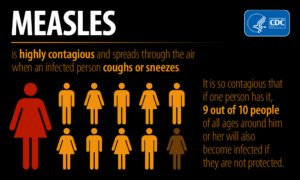Stay Informed – Learn About Measles
June 25, 2025
Measles is a very contagious disease caused by a virus:
- It can be dangerous, especially for babies and young children.
- Measles spreads through the air when a sick person coughs or sneezes.
- The virus can stay in the air for 2 hours after a person with measles leaves the space.
- It is so contagious that about 9 out of 10 people who come near a person with measles will also become infected if not vaccinated.
- The best way to prevent measles is with the measles, mumps, and rubella (MMR) vaccine.
- Anyone who is not vaccinated is at risk of measles infection and severe complications.
Recognizing measles symptoms and getting appropriate medical care is important to help prevent spread of the virus and to prevent severe complications.
Measles symptoms appear 7 to 14 days after contact with the virus. Common measles symptoms include:
- High fever (may spike to more than 104°F)
- Cough
- Runny nose
- Red and/or watery eyes
- Rash (breaks out 3-5 days after symptoms begin)
Measles can cause severe health problems, including:
- Pneumonia
- Swelling of the brain (encephalitis)
- Possibly even death
If someone in your family has measles symptoms:
- Keep them away from family members who are not sick.
- Everyone in the house should stay home to not get your neighbors or people outside of your home sick.
- Call a doctor or hospital right away to let them know someone in your home may be sick with measles. They will give you instructions.
When to go to the emergency room:
If the person who is sick gets rapidly worse, or has any of the symptoms listed below, take them to the emergency department of a hospital immediately. DO NOT WAIT.
- Trouble breathing (or breathing faster than normal)
- Pain when breathing or coughing
- Dehydration (dry nose and mouth, urinating less, crying without making tears)
- Fever or headache that will not stop
- Confusion, decreased alertness, or severe weakness
- Blue color around the mouth, low energy, or difficulty feeding (for young children)
Have someone call the hospital before you arrive. Let the hospital know a person who may be sick with measles is coming.
MMR vaccination is the best way to prevent measles and its complications. For those who cannot or prefer not to get vaccinated, risk of measles infection and severe illness during an outbreak is much higher. Recognizing measles and getting appropriate medical care is important to help prevent spread of the virus and to prevent severe complications.
Resource Tools
MDHHS FAQ
Measles – Before & After Travel Tips
Fact Sheet – Do You Think Your Child Has Measles?
Fact Sheet – Measles Isn’t Just A Little Rash
